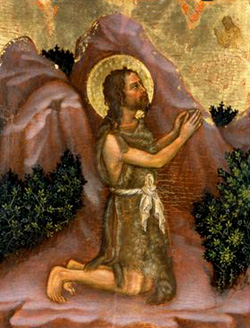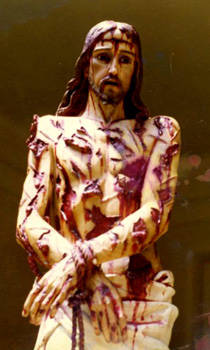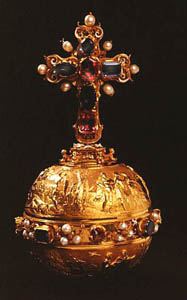 |
Special Devotions
Lent and Holy Week Meditations
The Apostolate of Suffering - III
Everything Sublime Is Born from Sacrifice
Prof. Plinio Corrêa de Oliveira
To make up for the lack of generosity of men, there are souls who are called to suffer in special ways to obtain the graces necessary for the plan of God for humanity.

St. John the Baptist: I am not worthy to untie the sandals of His feet... | |
When I think of these souls whose vocation is to suffer in a special way for these great plans of God, I think of St. John the Baptist who prepared the way for Our Lord Jesus Christ. When I am before any man or woman who is truly disposed to suffer for the Catholic Church and for Christian Civilization, I feel an impulse to kneel before him and say I am not worthy to untie the sandals of his feet, as St. John the Baptist said about Our Lord.
For nothing is nobler, nothing is more beautiful than this willingness to suffer in this way. Nothing shows a greater integrity of soul or a greater sincerity. Nothing is more efficient in its own way than the soul who suffers and is willing to suffer for others. A soul who suffers for the Catholic Church and Christian Civilization carries on his shoulders the future glory of Christian Civilization.
On such souls enormous problems fall; barriers obstruct their paths; persecutions, slanders and calumnies fall upon them. At the same time the most terrible difficulties for the Counter-Revolution are resolved because a soul accepted its sufferings to that extreme point. There are no words to describe the gratitude, veneration and respect owed to a soul who is truly capable of suffering in this way.
The beauty of the call to suffer
Someone might ask me why I have such enthusiasm for this aspect of suffering. Isn’t it more beautiful to pray or to act?
It is beautiful to pray and to act, and not just beautiful but something desired by God. The person who has this vocation must pray and act to fulfill the will of God for him.

Our Lord saw and measured every suffering and bore it manfully | |
Everything in the life of Our Lord Jesus Christ was full of pulchrum - of beauty - but the sacrifice of the Cross is something that has a beauty that exceeds everything else. Nothing surpasses the beauty of the sacrifice of that absolutely innocent Lamb of God. He suffered all that can be suffered, accepting it voluntarily, foreseeing everything He had before Him and facing it with a determination that had none of the softness and mediocrity of the modern world.
Our Lord Jesus Christ saw and measured every suffering He had to endure and bore it faithfully to its final point. The Passion is beautiful because He desired it. He wanted to suffer it to redeem man. This has a beauty that is unequaled.
It is clear that the souls that Our Lord Jesus Christ calls to associate themselves especially with His Passion are chosen souls; they are souls who take on what very few people have the courage to do.
There are many people who are willing to pray; there are many people willing to act. Where are the souls who are willing to suffer? Look for them, you won't find them. Where is the soul who is willing to say, "I will suffer, I will ask Our Lady to support my weakness, but I accept this voluntary cross." Where do we find these souls today?
How beautiful this call is! How much pulchrum there is in this acceptance of suffering! How much is gained from God in this movement of soul that accepts suffering! How many things that are broken are fixed; how many things that are dirty are cleaned. None of these solutions could be achieved without someone to suffer for them.
It is natural that in the family of souls of the Counter-Revolution that Our Lady should raise up souls who are disposed to suffer. It is part of the vocation of those who are called to be the foundation of the Reign of Mary. Souls disposed to make of suffering their first apostolate are necessary.
These are the first souls of the Counter-Revolution and carry out the most difficult and most necessary part of our apostolate. At this time, souls who are willing to suffer for the Counter-Revolution are urgently needed. The success, the élan, the brilliance of the Counter-Revolution depends upon the generosity of those who are willing to suffer for this ideal.
What kind of suffering accomplishes this goal?

The cross over the orb is a symbol of Christ's triumph | |
What does it mean to suffer? It doesn't mean to be continuously scourging oneself. To suffer is to accept willingly everything that Our Lord and Our Lady send our way and not go looking for the sufferings of our choice.
It is to suffer whatever Our Lady puts in our path. We should embrace that suffering and receive it head on. We can - and often should - act to eliminate the causes of that pain and suffering, but while it lasts, we should receive it joyfully and willingly because it is a great gift for our souls. It is a great gift for the souls of others, for the coming chastisement and the Reign of Mary. If we do this we immolate our wills to the will of Our Lady.
Above all, there must be souls willing to immolate themselves. We should follow Our Lord Jesus Christ and allow ourselves to be crucified for the Counter-Revolution to go forward. Without this, nothing can go forward. These souls who suffer are the glory of those ambiences, milieus and causes for which they suffer.
Therefore, this condition of suffering inside the Church Militant and the Counter-Revolution, is a sublime condition. The Counter-Revolution will only be entirely serious in its vocation at the moment it accepts suffering - accepts it with love and joy.
The suffering of bearing uncertainties and perplexities
This is how we should regard all the problems of our daily life. This is how we have to look at life, at the Counter-Revolution - not as the place for our personal realization, but as the place where we are called to suffer for a great and sublime cause. We should love the uncertainties and difficulties we have to face - and fight to resolve them even as we suffer because of them. If we face a moment of total uncertainty, of internal persecution, of financial insecurity, we must face such problems with combativeness and courage, and at the same time embrace and love the suffering that Our Lady put in our path.
If we cannot see what tomorrow will bring for us, if we are facing uncertainty and perplexity about what the future holds for us, we have to embrace and love this perplexity. Didn't Our Lord Jesus Christ say of Himself that even the fox has his den, but He, the Son of Man, had not even a stone upon which to rest His head?
To the measure that we cannot overcome these difficulties, to the measure that Our Lady allows these uncertainties and perplexities to remain - we should love them because they represent the wounds of Our Lord Jesus Christ imprinted on each one of us. It is each one of us participating in the Passion of Our Lord Jesus Christ as Our Lady desires it, and not as we desire it.
Everything great comes from suffering
So, if a person has to be a grape that must be smashed to make wine, an olive that has to be compressed to give its oil, or a grain of wheat that has to be ground to be transformed into bread, then that is what he should desire.
There is something of this in the order of nature, and Our Lord Jesus Christ refers to this in the Gospels: Everything that is truly creative, that is truly the start of something great or the foundation of a grand work, has to carry the weight of suffering in its nature.

The seed must die to make the grand oak | |
For example, take a seed that will produce a great tree. The seed is liberated from the fruit in an act of destruction, of the decomposition of the fruit that carries it. The tree is born from the destruction or defeat of the fruit. It is in this death, in this suffering of the first fruit, that the second fruit of every great work is born.
We find another example of this in how a mother gives birth to a child:she gives birth in pain. All the great things in life are conceived and executed in pain and suffering. Thus, we find this suffering is in the natural order of things. Everything that is great, that has grandeur, that is sublime, is surrounded with the aura of holocaust.
Without suffering, the Counter-Revolution will not be victorious. All the victories in the eyes of Our Lady have their source in those souls with the generosity to suffer. There is nothing more worthy of our enthusiasm and admiration.
We should feel sorry for those souls who desire to be rich or important to appear before others, and who ignore suffering as the true grandeur of the Counter-Revolution. What does this success and wealth mean in face of a man who suffers? It is nothing. It is mere dust.
St. Therese of the Child Jesus said something along this line. She had the desire to be and do everything for the Catholic Church in all places. And because she could not, she suffered. And in that suffering she said she realized that she suffered for all those people. She was there with them. There - in suffering - she found the true peace of her soul.
We need to feel the shame of our continuous lack of seriousness, our lack of courage, and turn to Our Lady and accept the cross she sends us.

This meditation by Prof. Plinio Corrêa de Oliveira was summarized,
translated and adapted by TIA based on a transcript of the tape
Posted April 6, 2009


Related Topics of Interest
 Expiatory Suffering in Creation and Redemption Expiatory Suffering in Creation and Redemption
 The Suffering of Being Rejected The Suffering of Being Rejected
 The Meaning of the Three Falls of Our Lord The Meaning of the Three Falls of Our Lord
 The Love of the Cross in Today’s Life The Love of the Cross in Today’s Life
 How Should We Follow the Passion of the Catholic Church? How Should We Follow the Passion of the Catholic Church?
 The Reproaches of the Passion - I The Reproaches of the Passion - I
 The Reproaches of the Passion - II The Reproaches of the Passion - II
 The Reproaches of the Passion - III The Reproaches of the Passion - III
 The Symbol of the Chalice in the Garden of Olives The Symbol of the Chalice in the Garden of Olives
 The Fidelity of the Remnant Throughout History The Fidelity of the Remnant Throughout History

Related Works of Interest
|
|
Special Devotions | Religious | Home | Books | CDs | Search | Contact Us | Donate

© 2002- Tradition in Action, Inc. All Rights Reserved
|
 |
|